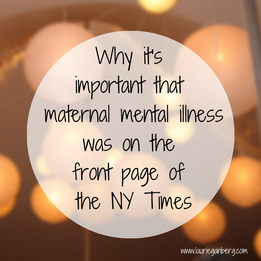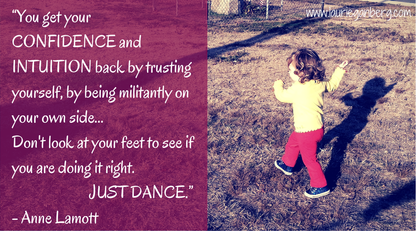
Two interesting news items related to postpartum depression popped up this past week. The first is news that researchers have identified a link between an oxytocin receptor blood marker in some women which increased their likelihood of experiencing postpartum depression. What does this mean? Well, if there were a blood test to give pregnant women to identify which ones were more likely to experience postpartum depression, we could proactively identify those women, doctors and families could put supports into place for the postpartum period ahead of time.
The second story is about a change in recommendations from the US Preventive Services Task Force about screening adults for depression. Now, if you're like me, you might be asking yourself what the US Preventive Services Task Force (USPSTF) is and what they do. Turns out, The Task Force is convened by Congress and reviews current clinical research to "improve the health of all Americans by making evidence-based recommendations about clinical preventive services such as screenings, counseling services, and preventive medications." This Task Force is now recommending that all adults be screened for depression because of its prevalence (1 in 10 all adults in the US will experience depression), and they specifically identified that all pregnant and postpartum women be screened. My reactions
It's great when postpartum depression gets media attention. It increases awareness of the huge number of families affected by emotional complications in pregnancy and postpartum . Screening and identifying those who are suffering is a critical first step.
However, there's an immense gap between screening and treatment. Postpartum women--particularly low-income mothers and mothers of color--obtain treatment for postpartum mood and anxiety disorders at abysmally low rates, even after they've been positively screened. Why?
There's also a little fact in the original research about the oxytocin receptor that's interesting. The study found that there was no connection between the oxytocin receptor and risk for PPD in women who had depression during pregnancy - the link was only in women who were not depressed prenatally. Not only does depression in pregnancy increase the risk for postpartum depression, but untreated prenatal depression is also a risk factor for unfavorable pregnancy outcomes including low-birth weights and pre-term births. So, we still need to screen all pregnant women AND treat those who are depressed. Other tidbits
The Massachusetts legislature overturned the Governor's veto of funding for the pilot program I mentioned above. I've been asking many of you in Massachusetts to contact your legislators about this recently, so thank you for all your advocacy!
Meanwhile, Congresswoman Katherine Clark and Congressman Ryan Costello introduced legislation, the Bringing Postpartum Depression Out of the Shadows Act, to increase and improve screening AND treatment for women with postpartum depression through grants to the states to develop new programs.
What's caught your eye in the news lately related to pregnancy or postpartum emotional complications?
 Senator Lovely speaking about her involvement with the PPD Commission. Senator Lovely speaking about her involvement with the PPD Commission.
I went to the screening of the maternal mental health documentary, Dark Side of the Full Moon, last night, organized by Leslie McKeough, LICSW - a Lynnfield therapist - and the North Shore Postpartum Depression Task Force. The documentary highlights the experiences of several women who experienced perinatal mood and anxiety disorders, the dismal state of screening for emotional complications in pregnancy and postpartum, and the barriers to treatment for these women. Interspersed are the news stories of the lives lost to maternal mental illness while they were filming the documentary.
Women feel guilty, self-conscious, isolated, and overwhelmed when they're experiencing emotional complications in the postpartum. Supporting women with perinatal emotional complications is about more than a 10-item questionnaire, though that's a good first step. It's about more than having a therapist's phone number, though that's needed too, and hopefully many people have that therapist's number or know where to look. It's knowing that if they reveal to you how they feel, they're doing so with fear and worry about not being a good mother, about their baby being "taken away," about never feeling like themselves again.
Supporting women with perinatal emotional complications is about having effective systems of care in the community that would include
These issues, this stigma, these barriers to care are why I and three colleagues founded the Every Mother Project with the belief that every mother deserves comprehensive perinatal support. We developed a Perinatal Toolkit for women's health professionals to better understand, recognize, know how to talk about, and support women through perinatal emotional complications. We've had lactation counselors, doulas, pelvic floor physical therapists, midwives, acupuncturists and many other birth and postpartum professionals download the toolkit. Our hope is that with more training and awareness for all the myriad of people who come into contact - and often develop quite close and important relationships - with pregnant and postpartum women and new parents, more women will feel heard and understood and will be able to be connected to the right supports. The movie didn't get into the racial and socioeconomic disparities that exist in maternal mental health, but I'd be remiss in not mentioning them here. There's been yet another study that examined stress in pregnancy and risk of postpartum depression, finding that more stress events (financial, partner, trauma, or emotional) in a woman's life was directly correlated with a higher risk for emotion complications. Other studies have identified that experiences of racial discrimination during pregnancy (which can be prevalent within medical systems) not only affect the pregnant woman's own emotional and physical health, but also impact the infant's stress physiology response. So yes, institutional racism and systemic oppression have real effects on pregnant and postpartum women of color and women in poverty, increasing their risk for perinatal emotional complications, all while making it harder for them to be identified and access treatment.
I'm so thankful for the chance to view Dark Side of the Full Moon, and that so many others did, too. We have much to do still to better support women through perinatal emotional complications - even in Massachusetts. Please, at least take a look at the trailer if you missed it. And maybe we can organize another viewing...
So, I promised to come back to the idea of intuition, how to find it and stick with it. Because, while it may feel easier to "stop the chattering mind" in order to make space for intuition in solitude, most of us aren't parenting in a peaceful, zen place away from all meddling, well-meaning voices that feed the rational mind's desire for a plan: a promise of steps to follow to succeed in raising this baby/toddler/teenager seeking - messily, noisily, and sometimes inconveniently! - to get their needs met. So, what then? Here are three things to help tap into your own intuition:
And lastly, just a word about posts on the internet - including this one! If something I've written here resonates, fantastic. If it doesn't land well, that's ok. I strive to write the way I approach my private practice: from a supportive, nonjudgmental place. I hope you "take what works and leave the rest" from my writing and from all the rest of the internet, too!  On 6/16/14, the NY Times published two articles on maternal mental health. This was above the fold, front-page media coverage for the emotional complications that mothers face. Let's talk about the cover story: 'Thinking of Ways to Harm Her': New Findings on Timing and Range of Maternal Mental Illness. First, a quick point about language. I don’t love that the headline led with the attention-grabbing reference to intrusive thoughts of harming a baby. And the article fell into the pattern of referencing either “postpartum depression,” which it makes the point of saying doesn’t accurately encompass the range of experiences, or “maternal mental illness,” which can come across as very medical. But the alternatives, like "perinatal mood disorders" or "emotional complications" have their limitations as well. So, I try to use a range to best speak to women's experiences. But back to the article... Women and families shared their experiences with depression, intrusive thoughts, and anxiety, demonstrating incredible vulnerability and courage. Writer Pam Belluck discussed the new research that backs up what clinical experience tells us: that emotional complications often start in pregnancy and are not easily identified as "just” depression, but frequently include overlapping features of depression, anxiety, obsessive compulsive disorder, and bipolar disorders. She touched on some of the factors that are associated with these experiences, the prevalence, and the range in timing when symptoms arise (during pregnancy and throughout the postpartum year). And there was mention of treatment: medications, therapy, support groups, and help to address impacts on bonding and attachment, though I wish there was more exploration of what treatment looks like for women and families. Belluck highlighted efforts to increase screening for postpartum mood disorders and the frustrating fact that more screening does not necessarily mean improved health: "A study in New Jersey of poor women on Medicaid found that required screening has not resulted in more women being treated...the law educated pediatricians and obstetricians, but did not compensate them for screening." In Massachusetts I am thankful that in Massachusetts we are taking some steps to increase screening. A 2010 law authorized the Department of Public Health to "develop a culture of awareness, de-stigmatization, and screening for perinatal depression." But changing a culture and eliminating stigma take time. Even if they are given a questionnaire, new moms often hide the truth of how they're feeling from their doctors and pediatricians out of shame and fear of judgment. And an OB who sees a woman for a mere 15 minute follow up appointment at 2 or 6 weeks postpartum may feel reluctant to ask further questions because they're unsure of where or to whom they would even refer her. The Massachusetts Child Psychiatry Access Project (MCPAP) aims to address some of these barriers by expanding its focus to include maternal mental health. Starting next month, doctors will be able to call a toll-free number to speak to a care coordinator to help find a mental health provider for their patient. MCPAP for Moms will be a great resource for doctors, but what about for mothers, their partners and families, and other providers? Granted there are some resources like the Massachusetts Postpartum Support International warmline (866-472-1897) and regional and community task forces creating systems of care for maternal mental health, but there are still gaping cracks women and families can fall through. What I’m most hopeful about in Massachusetts is a relatively small pilot project focused on preventing postpartum depression by putting postpartum doulas who can provide support and screenings in a few community health centers. A friend and colleague, Divya Kumar, Sc.M., is a certified postpartum doula and certified lactation counselor who works in one of these community health centers. Excited about the integration of services to address maternal health, Kumar says, “We need to change the way we do this...it's not just about preventing postpartum depression, but it's about promoting postpartum wellness and overall emotional health in new moms.” When a new mom brings her baby in for his well baby visit, Kumar is able to spend time with her helping with breastfeeding challenges, screen her for postpartum depression, and if needed, refer her to the mental health clinician down the hall who can see her that same day. And this is true even if the mother is not a patient of the health center. Plus, the community health center has midwives who also provide prenatal care so there’s the possibility for connection during pregnancy – important for the women who experience depression and anxiety during pregnancy and/or those who have a known mental health history. "Timely screening for perinatal emotional complications can save lives—especially in a community health center lucky enough to have comprehensive postpartum support AND mental health services right under one roof. [I am] so thankful for this pilot money and for centralized, accessible services," says Kumar, "We are offering services to families where the baby is seen at the clinic even if mom is not...We have caught a couple cases of PPD that way--huge, huge victories!" Until this pilot project can be replicated to reach more women, a woman (or someone in her family) needs the knowledge to recognize that what she's feeling isn't just new mom exhaustion, the courage to ask for help, and the resources to be able to find/afford/get to treatment. On top of all that, treatment must be specialized, connected to community-based supports, and welcoming. Dr. Kozhimannil, quoted in the article, speaks to the barriers: "There are also not enough treatment options…If a woman comes with a baby, and it’s a place treating people with substance abuse or severe mental illness, she may be uncomfortable.” (And yet, let's not forget that these are not mutually exclusive groups). When everything falls into place, it works. Timely, accessible treatment can help. As Jeanne Marie Johnson was quoted saying, once she received help, “It’s just a whole world of difference.” When I was looking for my office space, I thought about what it would be like for pregnant or new moms coming to see me. I looked for an office with an elevator, easy bathroom access, and parking. A chair that rocks for a breastfeeding mother, a hidden box of toys to distract an infant, water or a cup of tea to offer some comfort and hydration: these are all small ways I hope that the environment welcomes pregnant women and new mothers. And my connections to other resources—psychiatrists, acupuncturists, sleep consultants, lactation counselors, groups—form the foundation of a potential community of support for isolated new mothers and families. Ultimately, national media coverage of perinatal emotional complications like these NY Times articles helps to decrease isolation and stigma. I hope that this leads to more screening, more treatment, and more health for mothers and families. A bow of gratitude to the women who shared their stories and to Pam Belluck for writing these pieces. What's your take on the article? Please share in the comments. |
Therapy, Groups, Supervision, Consultation, Training in Seattle, WA and online in Washington state
Laurie Ganberg, LICSW, PMH-C (#LW60673320) ~ Specializing in Perinatal Mental Health, Trauma, & Fat Liberation
Now practicing through Fiddlehead Therapy, PLLC with online services and in person in Mountlake Terrace, WA
Home | Privacy | Contact | Zoom Link
© 2019-2024 All rights reserved
Laurie Ganberg, LICSW, PMH-C (#LW60673320) ~ Specializing in Perinatal Mental Health, Trauma, & Fat Liberation
Now practicing through Fiddlehead Therapy, PLLC with online services and in person in Mountlake Terrace, WA
Home | Privacy | Contact | Zoom Link
© 2019-2024 All rights reserved

